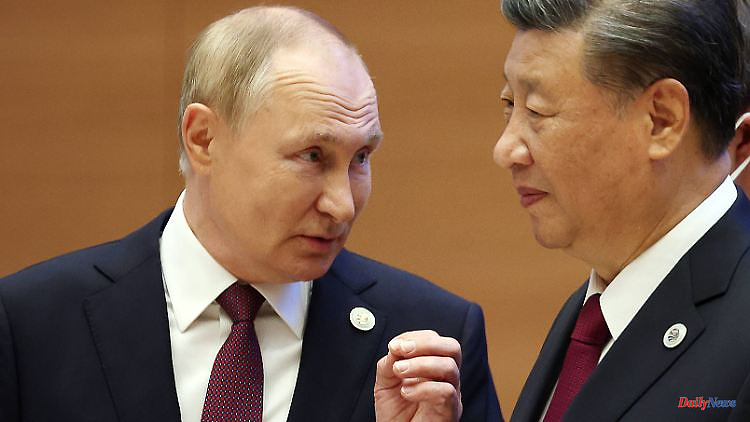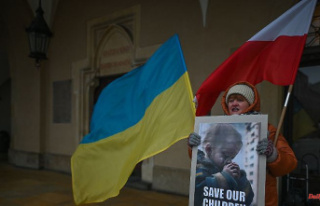After a year of war in Ukraine, the Chinese government came forward with a position paper. At least from a European point of view, the document is characterized by contradictions. Can it still trigger a peace process?
China's head of state Xi Jinping seems to be the only head of government that Russian President Vladimir Putin is still listening to. This was evident, for example, in the nuclear weapons issue. Since Xi spoke out against their use in Ukraine, Russian threats have diminished significantly. Putin also listens to Xi because he hardly has any other influential friends. One could also say: he surrendered himself to him.
It gives hope that China is now presenting a paper on the war in Ukraine. Is Beijing showing the way to peace here? Is China bringing all parties to the conflict to one table? The short answer is no. This is also indicated by numerous disappointed reactions from Western countries. This is mainly due to the fact that China still does not clearly name and condemn the Russian attack as such.
But what is this paper all about? After all, many points do not sound bad to European ears: Beijing, for example, calls for respecting the sovereignty of all countries and compliance with the grain agreement, offers help in the humanitarian crisis or calls on all sides "not to fan the flames" in the war. Ukraine and Russia should start a dialogue. And the Chinese leadership is also speaking out against nuclear weapons once again.
What is disappointing, however, is that this paper is not a peace plan, as China's leading foreign policy leader Wang Yi announced at the Munich Security Conference. It only comes along as a "position paper". And moreover as one in which there is not much that is new.
"With very few exceptions, the twelve points mentioned there have been repeatedly mentioned by official Chinese representatives over the past year," says Nadine Godehardt from the Stiftung Wissenschaft und Politik ntv.de. "What we are reading is not China's new positioning, but what we have been observing for a year." China experts like Godehardt describe the current Chinese position on the Ukraine war as "pro-Russian neutrality" - a contradictory formulation that is almost typical when it comes to China.
China is neutral in that it does not intervene in the war and, at least for now, does not support Russia with arms. And also by not participating in sanctions against the country, but, for example, continuing to purchase oil and gas from the neighboring country. Ukraine is not getting any help from China either. On the diplomatic stage, however, China is backing Russia, with the leadership repeating the Russian propaganda that the USA, NATO and the West are ultimately to blame for this war.
The Chinese position paper also contains such contradictions: "Especially from a European perspective, one cannot understand how one wants to stand for territorial integrity and national sovereignty on the one hand and at the same time want to see Russia's security interests protected," said Godehardt. "The cat bites its own tail." Because Russia justifies the attack on Ukraine in its propaganda with said security interests. But behind this is also the Russian narrative that NATO has continued to expand to Russia's borders, forcing Moscow to fight back.
According to Godehardt, the first point of the paper can also be seen in the context of the Taiwan question. "They want to make it very clear here that Chinese national sovereignty and territorial integrity are also meant." China is referring to Taiwan, which according to its own view is part of the People's Republic. The claim to the neighboring state is also concealed here. "So that's not meant so much in the direction of Ukraine, but only confirms the fundamental interest in this principle," says Godehardt.
China sees the war in Ukraine as a proxy war. This is shown less in this document than in two others that were also published this week. One of them was about the hegemony of the USA and the dangers allegedly associated with it. "This makes it very clear which perspective prevails in Beijing: that the United States is primarily to blame for this war." This is not new, but has been emphasized several times in various documents this week. "The war in Ukraine is viewed against this background," says Godehardt.
But that is a sticking point in this position paper. Should the USA be to blame? "You have to say very clearly that from a European point of view there is no agreement with China. We have a completely different idea of what caused the war." For example, that there is a very clear aggressor. But this point is very important for the Europeans. The federal government expressed its disappointment. The clear rejection of any use of nuclear weapons is to be welcomed. "At the same time, from our point of view, important elements are missing, first and foremost the withdrawal of Russian troops from Ukraine," says a government spokesman.
NATO Secretary General Jens Stoltenberg was similarly cautious. China doesn't have a lot of credibility, he said, because it hasn't been able to condemn Russia's invasion of Ukraine. Stoltenberg emphasized that Putin is not currently preparing for peace, but for more war and further offensives. At some point the war will probably end at the negotiating table. However, if you want a negotiated solution that will keep Ukraine as a sovereign, independent nation, you have to provide the country with military support. But China will hardly do that.
According to Godehardt, China has maneuvered itself into a dead end. What looks like concessions to the Europeans and the United States, such as the rejection of nuclear weapons, is "far too little" to win back the trust of the Europeans. But that would be necessary in order to be recognized as a mediator at all. According to Godehardt, however, China would isolate itself in its own camp if it were to show real concessions in terms of content, for example calling Putin an aggressor or supporting a victory for Ukraine. "I don't see a back door how to get out of there."












